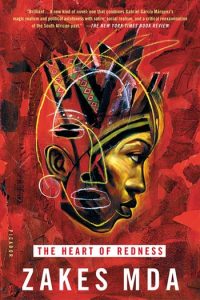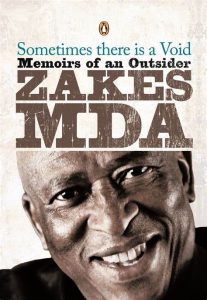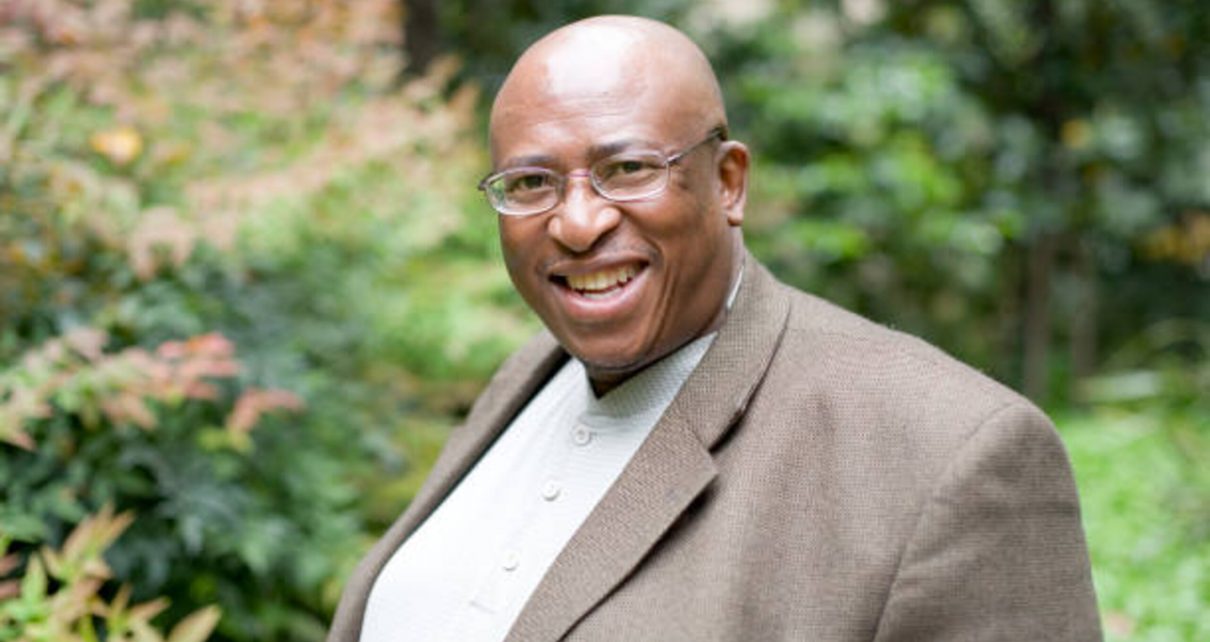Interview by Olatoun Gabi-Williams
The life of Zakes Mda, the celebrated South African artist, composer, writer, and activist, is a testament to the power of resilience, belonging, and the indomitable spirit of a man born into a world overshadowed by apartheid. In this riveting personality feature article, we delve into the extraordinary journey of this uncommonly gifted individual. From his childhood surrounded by legendary freedom fighters like Nelson Mandela, his first wife Evelyn Mase, Walter and Albertina Sisulu, Oliver Tambo, and other anti-apartheid activists, to his own pursuit of artistic excellence and political activism, Mda’s story is one that captures the essence of a nation’s struggle and the universal quest for identity.

Born in the heart of apartheid-era South Africa, Zakes Mda’s early life was deeply intertwined with the nation’s tumultuous history. Growing up in Herschel, a small town on the border, Mda was exposed to the pervasive racial inequalities that defined the era. As he recalls from our interview, “It was part of my political life as well. It was part of, so there was never a time when I just saw myself as, like, into other artists.”
However, Mda’s upbringing was not confined to the shadows cast by apartheid. His artistic talents emerged with a brilliance that transcended the boundaries of his environment. He played the flute, composed music, and even contributed political cartoons to established journals. Reflecting on his early creative pursuits, Mda remarks, “To me, all those things, it’s just art. You know, I wake up one day, I feel like painting a picture. I paint a picture. I wake up one day, I feel like composing a song. I do exactly that.”
Despite the suffocating grip of apartheid, Mda found solace in Lesotho, where his family sought refuge. Here, he continued to nurture his artistic gifts and discovered a broader perspective that would shape his identity. “I was growing up in that environment,” Mda reminisces. “In other words, I was not even aware that there was anything unique about being involved in all those different arts.”
Throughout his journey, art became a vehicle of both personal expression and political resistance. Mda’s creations served as mirrors reflecting the injustices of his time and his unwavering dedication to change. As he states, “In our art, we portray the political, whether we like it or not, whether we intend to or not.”
Birth amidst Apartheid
Zakes Mda’s remarkable journey begins in the heart of Herschel, South Africa, a town gripped by the oppressive clutches of apartheid. Born into this turbulent era, Mda’s life story is intertwined with the very fabric of his nation’s struggle for equality and justice. Reflecting on his early years, Mda shares, “Art has always been part of my life, you know, right from the beginning. It was part of my father’s life as well, and my brothers and so on.”
The rise of the Nationalist Party to power marked a pivotal turning point in South Africa’s history. With it came the institutionalization of white supremacy as law, casting a dark shadow over every aspect of life. Mda vividly recalls, “There’s no line of demarcation between life and politics, you know, life and art. In other words, politics is about life. It’s about life.”
Mda’s roots run deep within the struggle against apartheid, courtesy of his father, AP Mda, a prominent figure in the anti-apartheid movement. As he shares, “My struggles were not that much compared to the struggles of other artists and so on, especially because I’ve always had my parents, you know, who were professional people and were working even when, you know, I, you know, um, I pressed out of the family and was, um, was looking after myself.”
Amidst the turmoil, young Mda formed friendships with individuals who would go on to shape the destiny of a nation. His childhood bonds with future luminaries such as Nelson Mandela, Walter Sisulu, and Oliver Tambo foreshadowed a life marked by collective aspiration. These friendships, as Mda recounts, were characterized by a shared desire for justice: “We were prepared for that because we knew that we were suffering not just for ourselves. We were suffering for freedom.”
Nurturing Artistic Gifts
Amidst the shadows of apartheid, Zakes Mda’s artistic brilliance began to emerge, casting a radiant light on his early years. His innate talents, particularly in the realms of music and visual arts, were evident from a tender age. Mda reflects, “It was all intertwined. I lived art, you know, and I lived politics. I lived… The political itself was artistic.”
Mda’s artistic roots ran deep, nurtured by a family legacy steeped in creativity. His father’s prowess in painting and his musical pursuits left an indelible mark on young Zakes. “My father was a very gifted painter himself, but he never did that as a profession,” Mda reminisces, “When we were sitting at the table, then he would be sketching something… He became reputed for, you know, which means that the painting portrays you exactly as you are.”

Music became an integral part of Mda’s life, with the flute becoming his chosen instrument. His passion for music extended beyond performance, as he ventured into the realm of composition. “I feel like composing a song. I do exactly that,” Mda states matter-of-factly, highlighting the fluidity with which his artistic expressions flowed.
However, the artistic tapestry of Mda’s upbringing was interwoven with the threads of politics. The boundary between art and activism was porous, reflecting the realities of a nation in turmoil. Mda reflects, “In our art, we portray the political, whether we like it or not… We used poetry. We used theater. We used music to share insights about the nature of our oppression, to rally people to fight against that oppression.”
Exile to Lesotho
As the grip of apartheid tightened, Zakes Mda’s life took an abrupt turn, marked by a forced migration to Lesotho in search of sanctuary. This chapter of his journey reflects the agonising choices that many anti-apartheid activists were compelled to make, trading the familiarity of home for the uncertainty of exile. Mda recalls, “There’s always a family. You always know that when things are really, really bad… there’s somebody somewhere in the background there who would not watch you and see you starve to death and do nothing about it.”
The young Zakes Mda experienced a profound sense of displacement, a heart-wrenching departure from the place he had always known. He opens up, “You know, it was just part of who I was… It was all intertwined. I lived art, you know, and I lived politics.” Leaving his homeland meant not only physical separation but also a rupture in the fabric of his identity, as he grappled with the emotional toll of uprooting.
Yet, within the heartache of exile, there lay the seeds of transformation. Lesotho offered both solace and new possibilities. Mda reflects on this paradox, “It just depends on… those individuals… This was a term that was given to the new black elite after apartheid… Many of them became overnight millionaires, you know, getting contracts from the government through what was known as black economic empowerment.”
Lesotho’s sheltering embrace broadened Mda’s horizons, exposing him to a cosmopolitan environment that enriched his perspective. It became a crucible where his artistic gifts could flourish further, amidst a fusion of cultures and influences. This time of exile became a tapestry of challenges and growth, as Mda navigated the uncharted terrain of a new life while carrying the weight of his heritage and aspirations.
A Multi-Faceted Identity
Zakes Mda’s journey is a testament to the intricate tapestry of identity, where threads of art, activism, and belonging are interwoven in a symphony of expression. His artistic palette, enriched by a diversity of influences, paints a vivid picture of a man who defies singular categorisation.
Through his creative ventures, Mda’s sense of identity has evolved, shaped by the crucible of his experiences. He recounts, “I was growing up in that environment… I thought it was a natural thing to do. To me, all those things, it’s just art… There’s nothing in me that tells me, ‘No, no, but that’s a different field.’ For me, art is art.”
This fluidity in perspective and approach mirrors his broader journey of belonging. Mda’s canvas extends beyond familial bonds; it encompasses an affinity for his homeland, an allegiance to Pan-African ideals, and a recognition of shared humanity. He explains, “What I mean is there’s no line of demarcation between life and politics, you know, life and art… In other words, um, politics is about life. It’s about life.”
Mda’s exploration of belonging is not confined to geographical borders; it’s an exploration of shared struggles and aspirations. His creative tapestry becomes a mirror that reflects the nuanced shades of his identity – one that embraces both his individuality and his connection to a broader collective.
Artistry as Political Expression
In the crucible of apartheid’s darkness, Zakes Mda’s artistic talents emerged not just as expressions of creativity, but as potent tools of political resistance. His brushstrokes and compositions carried within them a subversive energy, challenging the oppressive norms that sought to stifle freedom.
Mda’s artistic journey transcended the canvas and the musical notes, infiltrating the realm of politics. As he reflects, “The art itself was political because it was part of who I was… The political itself was artistic.” In a landscape marred by injustice, art was his language, each stroke of his brush a rallying cry, each melody a call to arms.
The boundaries between art and politics blurred, merging into a harmonious chorus of dissent. The pages of his political cartoons, published in revered journals like the ANC and PAC, became platforms for incisive critique. Mda notes, “We used art to mobilise people… to share insights about the nature of our oppression, to rally people to fight against that oppression.”
Mda’s perspective offers a profound understanding of art’s profound resonance as a catalyst for change. In his hands, the flute became a weapon of harmony, the brush an instrument of truth, and the pen a force for justice. His creations resonated not just in galleries and concert halls, but also in the hearts of those yearning for liberation.
Crafting a Legacy
Zakes Mda’s artistic journey transcends the confines of his chosen mediums, leaving an indelible mark on both South African and global landscapes. His creations, infused with the essence of his experiences and convictions, reverberate far beyond the realms of mere aesthetics.
Through his political cartoons and writings, Mda wielded his artistic prowess as a mirror to society’s complexities. As he aptly puts it, “Our art has always been political… Our art has always been a weapon for the struggle.” Each stroke of his pen and brush carried the weight of a nation’s aspirations and a fervent call for change.
Mda’s novels, like “The Heart of Redness,” emerge as intricate tapestries woven from threads of tradition and modernity. In the words of Mda, “There is no conflict between tradition and modernity… Both have the good and the bad in them.” With masterful storytelling, he navigates the clash and fusion of eras, inviting readers to explore the dynamic interplay between history and progress.
“The Madonna of Excelsior,” a work rooted in historical events, exposes the underbelly of societal injustices. Mda’s exploration of the 1971 trial encapsulates a nation grappling with its demons, illuminating the shadows cast by apartheid’s legacy. Through his prose, he reclaims narratives, giving voice to those who were silenced by the tides of history.
Mda’s legacy is one of artistic courage, unapologetic commentary, and unyielding advocacy for justice. His creations serve as bridges connecting the past, present, and future, uniting generations in a shared quest for truth and transformation.
Engaging with Radicalism:
Zakes Mda’s journey extends beyond artistic realms, encompassing a dynamic engagement with political formations that sought to challenge the shackles of apartheid. Through his participation in movements like the Pan-African Congress of Azania and the Pursuit of Conscience Party (PCP), Mda ventured into uncharted territories of activism, shaping his role as an agent of change.
As Mda himself reflects, “Our struggles were like those of any other nation struggling for independence and freedom.” These words encapsulate his profound understanding of the interconnectedness of struggles across the globe. His involvement in these formations served as a testament to his unwavering commitment to the broader cause of justice and liberation.
Mda’s activism was not confined to rhetoric alone; he embraced actions that pushed boundaries and tested the limits of resistance. From crafting provocative slogans to participating in audacious endeavours such as attempted kidnappings and political assassinations, he embodied the spirit of daring confrontation against an oppressive regime.
Amidst the fervour of activism, Mda’s pragmatic approach emerges as a hallmark of his character. His reflections unveil a nuanced understanding of the power dynamics within the struggle. He candidly shares, “Sometimes you would resist a particular mission because it was not necessary… or it was futile.” This insight into his decision-making process underscores his dedication to a cause greater than any single act – a cause that demanded calculated actions for lasting impact.



